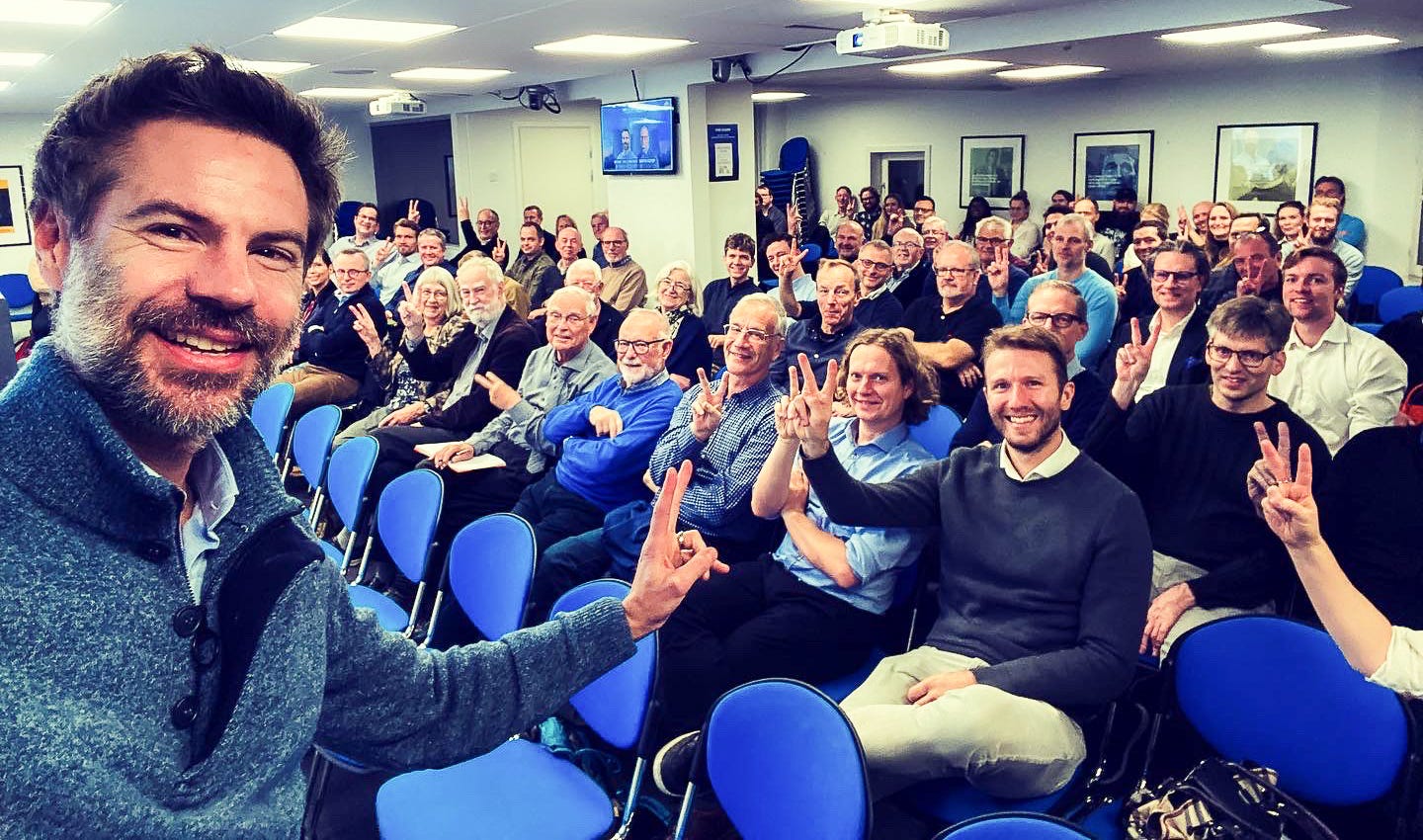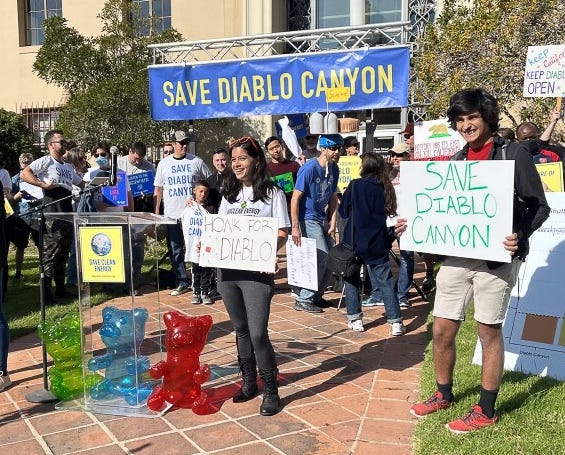A Rave Review and a Request
Leading British newspaper The Telegraph calls San Fransicko a "Revelatory, Must-Read" Book!
Friends! One of Britain’s most respected newspapers, The Telegraph, has published a rave review of San Fransicko (see below), calling it a “revelatory, must-read” book and giving it 5 out of 5 stars.
The review comes at an exciting time for Environmental Progress’s work on drugs, crime, and homelessness, which we call our Peace Program. Last year we co-founded the California Peace Coalition (CPC) of recovering addicts, parents of addicts, parents of children killed by fentanyl, and community leaders to advocate a humane and practical solution to America’s drug addiction, overdose, and poisoning crisis. We just held another protest in San Francisco last week.
Have no fear: Environmental Progress is still doing cutting-edge work on energy and the environment, as anyone who reads this Substack newsletter knows. We are in the midst of a terrible global energy crisis stemming from environmental alarmism, over reliance on weather-dependent renewables, and lack of nuclear energy, which EP has repeatedly warned of since our founding in 2016.
Me at an Apocalypse Never event in Copenhagen
As a result, our work is growing in influence. I have just returned from Finland, Sweden, Denmark, and Hungary where I met with senior policymakers, journalists, and researchers for a series of well-attended book events. Nuclear energy is back on the table in a big way, underscoring why telling the whole truth is always the best policy.
We couldn’t do what we do without your support. I hope you will consider supporting Environmental Progress with a year-end donation. Every donation counts because we operate on a shoestring. All contributions made through Environmental Progress’ web site are tax deductible. If you make a contribution of $100 or more, we will send you a signed copy of either Apocalypse Never or San Fransicko.
One of the unanticipated consequences of the success of San Fransicko has been increased sales for Apocalypse Never. Unfortunately, that has meant Apocalypse Never has been sold out in many book stores. The good news is that EP has copies on hand, and you can get yours, signed, for a loved one, and in time for the holidays, by donating to us now. And if you haven’t already, please subscribe to this Substack, so we can keep giving it away for free, and not be forced to create a paywall.
EP’s work is simple and effective. We seek out the truth, whatever it may be, and report on it. We incubate ideas, leaders, and movements. Over the next three years, Carus Books and HarperCollins will publish two new books, The War on Nuclear: Why It Hurts Us All, and the third and final installment in the trilogy about the crisis facing our civilization that started with Apocalypse Never. During that time, we will continue to grow both the pro-human environmental movement and the drug peace movement.
Our work is yielding real world results. Today, after six years of hard work, the pro-nuclear movement exists as an autonomous movement independent not only from the nuclear industry but also from Environmental Progress. Isabelle Boemke, a charismatic and articulate pro-nuclear leader organized a big rally last weekend to save Diablo Canyon nuclear plant. If things keep going the way they are going, the pro-nuclear movement will save California’s last nuclear plant by this time next year.
🙏❤️
Michael
P.S. Please check out the great review of San Fransicko in The Telegraph below!
Over the past 50 years, a consensus has emerged on the American Left that homelessness is caused largely by poverty and discrimination; the solution, they say, is not to judge the poor souls that sleep rough but to spend more money on them. San Francisco has become a laboratory for these ideas, writes Michael Shellenberger in this revelatory, must-read book – and the results contradict almost every aspect of the Left-wing consensus.
The Golden City, where the hippies wore flowers in their hair, spends six per cent of its annual budget on the homeless, including $31,985 (£24,195) per head on housing alone. Yet while homelessness declined nationally from 2005 to 2020, here it almost doubled, to 8,124.
A nice climate and pricy housing cannot be the only causes (other cities are as warm and more expensive, but have fewer people on the streets). Quality of life has also declined thanks to open drug use, burglaries and the prevalence of fecal matter. In 2019, the city spent $100 million on street cleaning, four times more than Chicago despite Chicago having 3.5 times more people – and in three years also had to replace more than 300 lamposts corroded by urine.
Complaints about such problems are often dismissed as an elitism that legitimises violence (curious, as “reported attacks on the homeless declined nationwide between 2008 and 2017 from 106 to 29”), yet a city that prides itself on loving its homeless population fails to provide 5,180 of them with the most basic thing they need: strong shelter from the elements. Instead, rich donors distribute tents, leading to encampments.
Shellenberger – a resident, environmental journalist and liberal on the slow road to Damascus – says that some of the blame rests with the very people who want to help. Historically it was assumed that housing should be used as a carrot to tempt folk off the streets: quit drugs, take your meds and we’ll help you find an apartment.
But activists became convinced that this was the wrong way around, that housing is a right and people will only pull themselves together once they’ve got a roof over their heads. Anything less than the offer of permanent accommodation is an insult and a waste of time.
As the provision of shelter fell out of favour, however, land values in San Francisco continued to rise, making it harder for city officials to expand the stock of living spaces. Today both housing and shelter are insufficient, leaving people to sleep in doorways instead.
The perfect is the enemy of the good. Take mental health. Liberals will readily tell you that the streets are full of sick people because Ronald Reagan cut funding for mental institutions, yet Shellenberger points out that they were shut by Democrats, too – to save money and because activists got it into their head that any form of asylum, even the most gentle and progressive, was wrong.
For instance, in 2004 Californians voted to spend over $2 billion extra on mental health provision – exempting involuntary incarceration, which meant the money was splashed on middle-class services such as exercise classes and gardening. Meanwhile, the very sick, unable to care for themselves and a danger to others, graduated from asylums to prisons, or self-medicating on the streets.
When it comes to the war on drugs, painted by the Left as authoritarian and racist, Shellenberger argues that though there has been a sharp rise in incarceration generally, “only 20 per cent of prisoners in all jails and prisons are there for drugs”. Violence drove a prison boom, stricter drug sentences less so, and if drugs were legalised overnight, this would have a negligible effect upon the racial make-up in prisons.
The real problem, suggests the author, is the refusal to prosecute the war on drugs. San Francisco has effectively gone down the route of decriminalisation, and become a safe space for addicts and pushers.
Shellenberger concludes that at the heart of much of this is a perverse cult of victimhood, reflected in the very language we use. The word “homeless” is passive. It implies that the individual is the victim of a social problem beyond their control, ie the unfair distribution of property. So long as policymakers believe this, they fail to grasp the complex psychological factors that keep people from making better choices. In 2018, San Francisco moved on 150 people in a month; only eight of them accepted the offer of shelter.
There is much in the argument for liberal readers to contest. The relationship between homelessness and drugs, for example, is chicken and egg: do people end up on the streets because they’re doing crack or do they start doing crack because they’re on the streets? Shellenberger touches upon the thesis that violence is driven by politics and culture – that when the poor or minorities are told that the status quo won’t help, or is actively against them, we historically see peaks of anti-social activity (ie from the 1960s to the 1990s). If that is true, then the rise of Black Lives Matter is very worrying.
But, again, is this to look at the problem the wrong way around? What if people lose faith in the status quo because it has failed, and it’s this societal or economic failure driving dislocation?
The work of political scientist Robert Putnam suggests that levels of social cohesion are linked to inequality: this can lead to people passing the buck (the system is stacked against me, they say, so I won’t bother to try), but has also historically been overcome by voluntarism, collective effort and state intervention. One can likewise infer from Shellenberger’s book that what is needed isn’t less government – the classic conservative remedy – but old-fashioned liberal paternalism, coercing people to make the right choices.









Well done Michael. I have your book in queue to be read. I'll sneak it in front of The Gulag Archipelago Vol II. Cheers!
Much love and respect for standing up for positive solutions! 😎